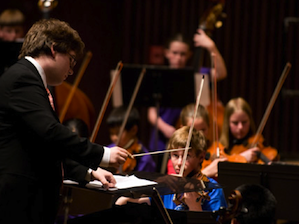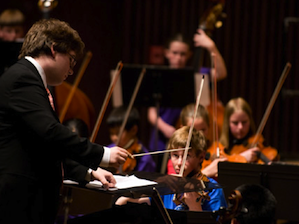
My SFCV feature Portraits for a Young Musician was originally titled “Notes to a Young Musician” thinking of Ranier Maria Rilke’s “Letters to a Young Poet,” those 10 inspiring letters addressed to a young man tossed between a career in literature and a career in the Austro-Hungarian army.
The problem is that I can’t play Rilke’s parallel in music; I’m not a musician. I’m merely a journalist, gathering up shiny bits of the zeitgeist and putting them in the display window. But in my travels around the classical music culture for this piece I heard over and over stories about giving or receiving advice.
One of the people I talked to was Matthew Cmiel, who himself writes for SFCV. He studied composition at the Curtis School of Music, moved to San Francisco, is an alumn of the Crowden Music School (2003), he received a second degree at the San Francisco Conservatory, and has developed his own ‘portfolio-career’ that includes a teaching position at Ruth Asawa San Francisco School of the Arts (SOTA), where he’s the director of orchestras. He also earns commissions from various new music groups he works with. Cmiel's work was just included on Mobius Trio's new CD here, and also on the the Del Sol String Quartet's Del Sol Days.
He cobbles his work life together, lives at home, teaches three hours a day five days a week, and enjoys the freedom to create. He’s chosen the poet’s life and it works. (He’s even written a symphonic work based on Rilke’s Sonnets to Orpheus.)
“It’s true there are fewer venues,” he told me, “and yes it’s very hard to get a job at the symphony, but you can play at museums and churches. And public schools are always looking for musicians, even if only for one-time appearances. Most of my friends have one primary income source, either in a coffeehouse or as teacher. But it works.”
Incidentally, Cmiel notes that of the 40 students in his graduating class at Curtis, 35 are still in music, although mostly as students. Meanwhile, at SOTA, last year’s graduating class included 180 students, of which 27 were in music. And to this point, 25 are still in music.
“I have a student right now,” Matthew told me. “He’s 17, a senior, and trying to decide whether to stay with music. I would say he’s moderately talented; he’s qualified, he’s skilled. Last year he came to me and said, I know I am not the best of the class, but I love music. And I have to decide whether to stay with this. This is one of those defining moments when, as a teacher, you can make such a difference. I looked at him and said, You know, if you love it, I don’t think you should give up music. Maybe you don’t want to major in music but you can keep playing. The truth is I don’t care if my students major in music. My goal is to foster their interest and encourage them to love music for the rest of their lives.
“For me, if you have the drive to be an artist of any type and you want to do it, then do it. And the reason should be because you have something to say and art is a way to get people to listen and to communicate. That’s beautiful.”

